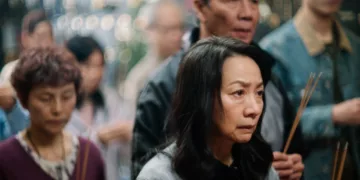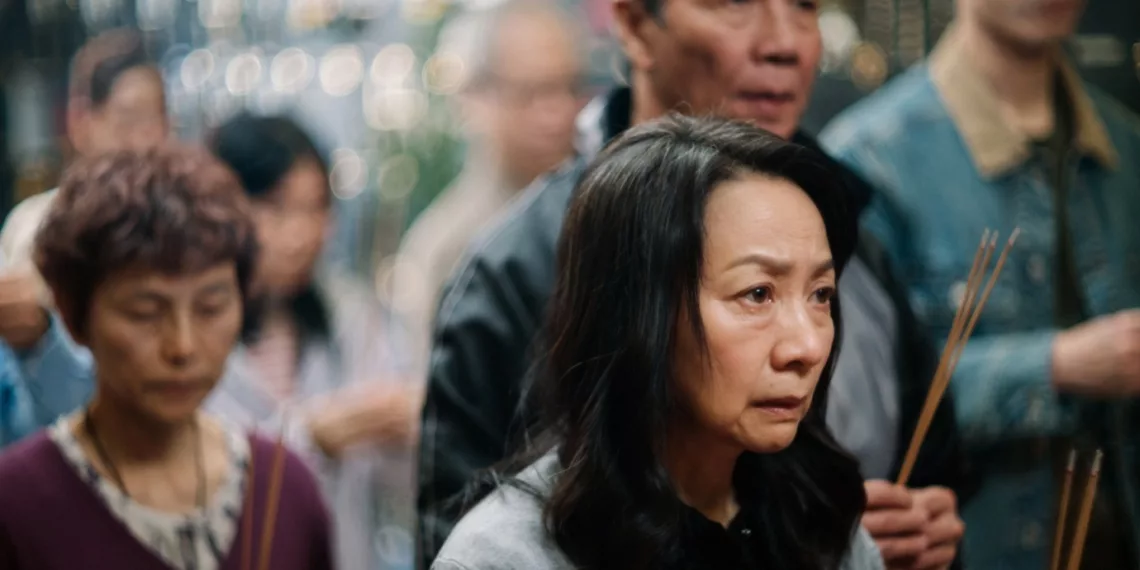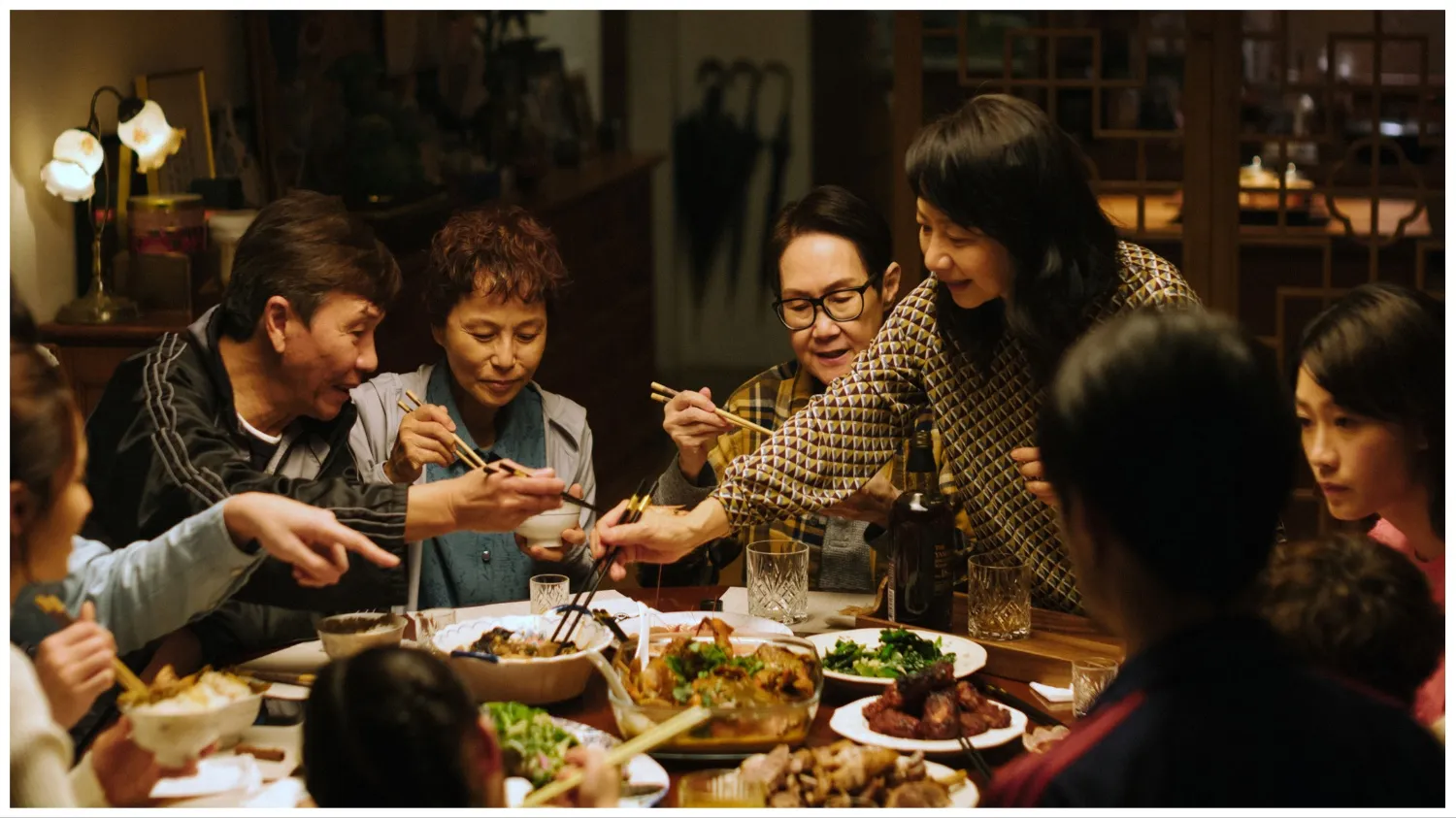Hong Kong director Ray Yeung has quietly built a rich filmography exploring LGBTQ stories, often focused on the overlooked lives of older queer couples. With his latest drama “All Shall Be Well,” he once again brings empathy, nuance, and emotional power to familiar human relationships complicated by societal prejudice.
Set in modern Hong Kong, the film introduces us to Pat and Angie, lesbian partners in their late 60s who have built a loving life together after four decades as a couple. Though largely accepted by friends and Pat’s family, their romance remains unrecognized in the eyes of the law. When Pat suddenly passes away, Angie grieves the loss of her soulmate. She soon realizes the full extent of her vulnerable position, as legal technicalities allow Pat’s relatives to contest inheritance rights and even her ability to remain in the home they had shared.
As heartbreaking as it is thoughtful, All Shall Be Well promises to resonate with anyone who has loved and lost. Yeung’s deft direction and richly drawn characters shine a light on the realities many couples face when social tolerance and legal protections don’t align. Full of quiet power and grace, it’s a compelling new addition to his essential queer filmography.
A Lifetime Together Threatened
At the heart of All Shall Be Well lies the deep bond between Angie and Pat, an unwavering couple whose four decades together overflows with easy affection and mutual caretaking. We first meet them cooking in their roomy, sunlight-filled flat, the kind of home tailored to a mature relationship. Though never formally wed, Angie and Pat’s commitment to one another feels intrinsically understood.
Pat comes from a working class Hong Kong family, while Angie had similar factory roots prior to the successful textile business they built as partners. Despite discrepancies in wealth and status, Pat’s relatives have embraced Angie as one of their own. Niece Fanny and nephew Victor clearly adore their Auntie Angie, who attends family meals and holidays with warmth and familiarity.
This cozy dynamic shifts instantly when Pat dies unexpectedly in her sleep. Angie’s world is upended by grief, now forced to navigate funeral arrangements and financial futures alone. Her alienation only grows when technicalities around Pat’s lack of a will come to light. With no legal claim to the home they shared for 30 years, Angie faces eviction by Pat’s brother Shing, the inheritor.
As motives centered on money, property, and inheritance take shape within Pat’s family, their treatment of Angie turns callous and conveniently ignorant of her significance as Pat’s life partner. Though Pat clearly wished to be laid to rest at sea, the family intervenes to claim her ashes. Each slight slowly strips away the life Angie knew, challenging her sense of belonging and forcing her to fight for the wishes of the woman she loved.
Examining Love and Loss
Yeung handles the raw pain of sudden loss with nuance, steeping many scenes in the mundane rituals now colored by Angie’s ache for her missing partner. Small reminders permeate the flat they once shared, a visual emphasis on absence lingering in Pat’s untouched wardrobe, her glasses left mid-task. Through glances and posture, Au Ga Man movingly embodies the profound disorientation spurred by grief, a once-moored existence drifting untethered.
Rather than big showy moments, the film’s emotional power flows from the gentle current running under daily life, as when Angie reflexively prepares portions for two. Her longing and uncertainty is echoed by Leung Ming-Kai’s evocative cinematography, the cramped compositions keeping Angie contemplated behind scaffolds and windows, HEIGHTENING her isolation.
Money and property concerns unveil tense class dynamics long-simmering within Pat’s family. While Pat and Angie built considerable success together, her relations struggled in Hong Kong’s harsh economic landscape. Brother Shing swallows pride working night shift parking, while Victor drives Uber just to afford any flat at all.
This context explains, though does not excuse, the growing opportunism that feeds their bitterness toward Angie. In their eyes, she did not fully earn such enviable stability. That their lifelong respect pivots so abruptly exposes just how conditional tolerance can be.
As marriage equality fights continue in Hong Kong, the film underscores their real-life urgency through Angie’s plight. Without spousal rights, her claim to their shared home and assets disappears, despite decades as Pat’s family in all but legal status. She receives no voice in burial disputes, no authority.
By denying LGBTQ couples equal protections, the legal system enables even relatives to conveniently dismiss the legitimacy of their partnerships when inheritance is at play. All Shall Be Well puts an intimate human face on the precarity this creates.
On the surface, Pat’s loved ones demonstrate acceptance, even adoration for the couple. But their actions in the wake of her passing provide stark counter evidence. Fair-weather support quickly crumbles when recognizing Angie’s rightful place would threaten their own interests. Rather than rising to meet the moment’s moral tests, long-held prejudices eclipse any empathy.
For Shing and the others, embracing difference was always more theoretical than actual until confrontation by legal small print makes it inconvenient. This speaks sober truth to the gaps so many civil rights struggles still must bridge between tolerance and actionable justice.
“Explore the complex relationship between a mother and her son in Jesse Eisenberg’s directorial debut, ‘When You Finish Saving the World’. Our When You Finish Saving the World review delves into this poignant narrative, showcasing standout performances by Julianne Moore and Finn Wolfhard in a tale of generational divide and personal discovery.”
Crafting an Intimate Epic
All Shall Be Well marks an exceptional next chapter in Ray Yeung’s resonant filmography spotlighting overlooked LGBTQ stories. As both writer and director, his thoughtful creative vision translates onscreen through unspoken nuances in blocking, framing, and production design elements amplifying the narrative.
Yeung’s script first brings lucid shape and intimate detail to the little-seen experience of aging lesbian couples in Hong Kong. But his sensitive direction is equally crucial, modulating graceful tonal shifts from domestic sweetness to alienating grief. He places us fully into this relationship with wisdom and care.
Much like his recent award-winner Suk Suk, standout cinematography emphasizes isolation, quartzing Angie behind window frames and guards. When among Pat’s relations, she often lingers out of focus, her despair literally blurred within the family that once embraced her. It’s a visually impactful encapsulation of her sudden outsider status.
In a stellar late-career turn, Maggie Li Lin Lin delivers clever flashes of stubborn wit as Pat, lip syncing playfully to songs while cooking. She leaves a joyful memory by which to judge her family’s later cruelty. But the film belongs to Patra Au Ga Man’s moving portrayal as the bereft Angie.
Registering shock, outrage, and profound uncertainty, her nuanced reactions avoid excess melodrama while tapping vast wells of empathy from the audience. We cling to this emotional anchor amid swirling injustices.
Yeung’s crew enact his intentions gorgeously at every level. Albert Poon Yick Sum’s warm production design realizes the couple’s home as a lived-in scrapbook, framed photos and trinkets recounting a shared history. Each prop carries poignant weight after Pat’s absence.
And Leung Ming Kai’s exquisite cinematography maximizes the expressive use of color and negative space. He frequently cradles Au’s careworn face in intimate close-up, her anguish plainly etched for our connection. Their combined craft builds toward a complete emotional experience rich in connections both human and aesthetic.
Together this talented creative team shepherds a deeply-affecting chronicle of love’s fragility in a system stacked against it. But ultimately, All Shall Be Well filters hardship through enduring devotion’s lens.
Echoes of Themes Explored
Fans of Sebastián Lelio’s Oscar-winner A Fantastic Woman will appreciate the thematic overlap with All Shall Be Well. Both showcase older queer couples whose legitimacy is harshly rejected after the death of one beloved partner. Stripped abruptly of homes and authority by the surviving partner’s family, Marina in A Fantastic Woman and Angie here illuminate similar societal prejudices through their disenfranchisement.
Yet Yeung brings his own stylized realism and cultural viewpoint to Hong Kong’s specific inequities. His ongoing exploration of oft-marginalized LGBTQ narratives also offers resonance for audiences who celebrated his earlier films. Dynamic family drama Suk Suk movingly charted the costs of secrecy between two married fathers finding late-in-life companionship.
And his acclaimed romance Front Cover presented barrier-breaking portrayals of gay Asian men rarely centered onscreen. Fans of those previous projects will recognize Yeung’s light hand at crafting complex characters caught between duty and desire. His focused voice interweaves universal relationship truths against diverse backdrops of societal resistance.
Experience the haunting realities of wartime isolation in our The Damned review. Follow a group of Union soldiers during the Civil War as they face the harsh winter frontier and question their purpose. Discover how this film’s naturalistic performances and evocative cinematography bring this historical drama to life.
A Triumph of Compassion
Ultimately, Ray Yeung has crafted another superlative entry in his essential queer filmography with All Shall Be Well. Timely and tender in equal measure, this graceful drama presents an intimate view into realities still unseen onscreen. Older lesbian lovers tenderly entwined, a family elasticity tested by loss, the quiet heroism required to fight for one’s rightful place when the system would prefer you unseen.
Leavened by its compassion, the film builds to cathartic emotional depths through authentically-sketched characters and the guiding vision of Yeung’s thoughtful direction. Gorgeous cinematography immerses us within each poignant story beat, the camera’s patience matching our own as we witness goodness under duress.
Flawed people do regrettable things, but the purity of Angie and Pat’s connection shines through with hard-won hope. Forged in resilient love, their example leads the way forward.
Beyond its subtle power as personal storytelling, All Shall Be Well resonates through larger social echoes, too. Unfurling at this very flashpoint moment for Hong Kong’s own marriage equality reckoning, Yeung reminds us elegantly that these intimate human rights questions are anything but theoretical. They beat within every couple awaiting the freedom to chart their own course. May we honor their patient struggle through compassion and moral imagination.
For this reason and so many beyond, All Shall Be Well deserves cinema’s full attention. Its sensitive grace finds revelation in even loss’s darkest corners. A small masterwork earning its place alongside the most affecting romances ever filmed. Keep the tissues close, and don’t dare look away.
The Review
All Shall Be Well
A sublime piece of filmmaking rich with humane insight, All Shall Be Well heralds the continued rise of an empathetic directorial voice in Ray Yeung. It pierces and warms in turn.
PROS
- Nuanced exploration of grief and loss
- Strong central performance by Patra Au Ga Man
- Thoughtful direction and cinematography
- Resonant themes of family and societal dynamics
- Spotlights need for legal protections of LGBTQ relationships
- Deeply emotional without being melodramatic
CONS
- Some secondary characters less developed
- Plot can feel schematic at times
- Story escalates quickly to legal disputes
- Pacing drags slightly in second act
- May rely too heavily on similarities to "A Fantastic Woman"

















































